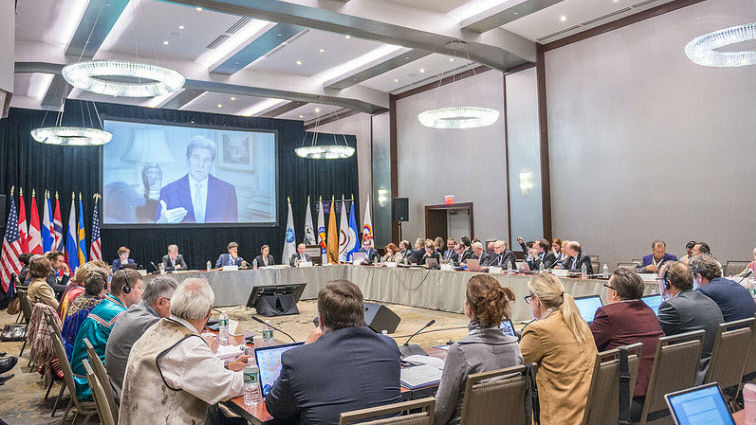Arctic Council Continues Environmental Studies

The Arctic Council concluded their latest meeting in Portland, Maine, on October 6, hearing updates from a range of working groups involved with environmental protection of the region.
The three currently active task forces of the Arctic Council presented updates on their work to advance cooperation on Arctic marine issues, enhance cross-border scientific cooperation and survey the current state of telecommunications infrastructure in the Arctic.
The Arctic Council’s six working groups also reported progress on specific elements of their work, including:
• A suite of projects addressing short-lived climate pollutants, highlighting the importance of practical measures to reduce black carbon emissions and introduce options for renewable energy investments in the Russian Arctic
• An assessment of new chemicals (some used as replacements for banned substances) that are now being found in Arctic environments and biota, raising new concerns
• A report summarizing the status and trends in key biotic elements of the Arctic marine environment
• A recently-held exercise, led by the U.S. Coast Guard, supporting the 2011 Agreement on Cooperation on Marine Oil Pollution and Response in the Arctic, which provided an important opportunity to improve international cooperation and preparedness
• A project to develop an interactive, user-friendly tool to capture Arctic conditions and shipping-related activities, allowing for trend and risk analysis for the Arctic marine environment
• A project providing an updated overview of the Arctic economy (including subsistence activities), socio-economic conditions, and environmental issues that aims to improve the knowledge base for policy-making to support sustainable development
The Council approved an updated strategic plan for its Arctic Contaminants Action Program and a new communications strategy for the Arctic Council. It also agreed in principle to undertake the development of a long-term strategic plan for the Council.
“This week’s meeting in Portland underscored the Council's cooperative spirit and the urgency of the tasks at hand. The effects of climate change are revealing themselves faster in the Arctic than anywhere else in the world, so the Council’s groundbreaking work to advance knowledge and prepare for the future is critical to helping Arctic communities build resilience in the face of these rapid changes,” said Ambassador David Balton, Chair of the Senior Arctic Officials.
The Council holds Senior Arctic Officials’ meetings roughly every six months, and Ministerial meetings roughly every two years. The next Ministerial meeting will take place in Fairbanks, Alaska on 11 May 2017.
The United States Chairmanship began in 2015, and will run through the Ministerial meeting in Fairbanks on 11 May 2017, at which point Finland will assume the Chairmanship of the Arctic Council.
During the United States Chairmanship, this is the only Senior Arctic Officials’ meeting that will take place outside of Alaska. Other locations include Anchorage, Fairbanks, and Juneau.
The eight Arctic States are Canada, the Kingdom of Denmark, Finland, Iceland, Norway, the Russian Federation, Sweden, and the United States.
The six indigenous Permanent Participant organizations are the Aleut International Association, the Arctic Athabaskan Council, the Gwich’In Council International, the Inuit Circumpolar Council, the Saami Council, and RAIPON – the Russian Association of Indigenous People of the North.
The six Working Groups of the Arctic Council are:
ACAP (Arctic Contaminants Action Program)
AMAP (Arctic Monitoring and Assessment Program)
CAFF (Conservation of Arctic Flora and Fauna)
EPPR (Emergency Prevention, Preparedness, and Response)
PAME (Protection of the Arctic Marine Environment)
SDWG (Sustainable Development Working Group)
The Arctic Council’s three current Task Forces are:
Task Force on Arctic Marine Cooperation
Task Force on Enhancing Scientific Cooperation in the Arctic
Task Force on Telecommunications Infrastructure in the Arctic
